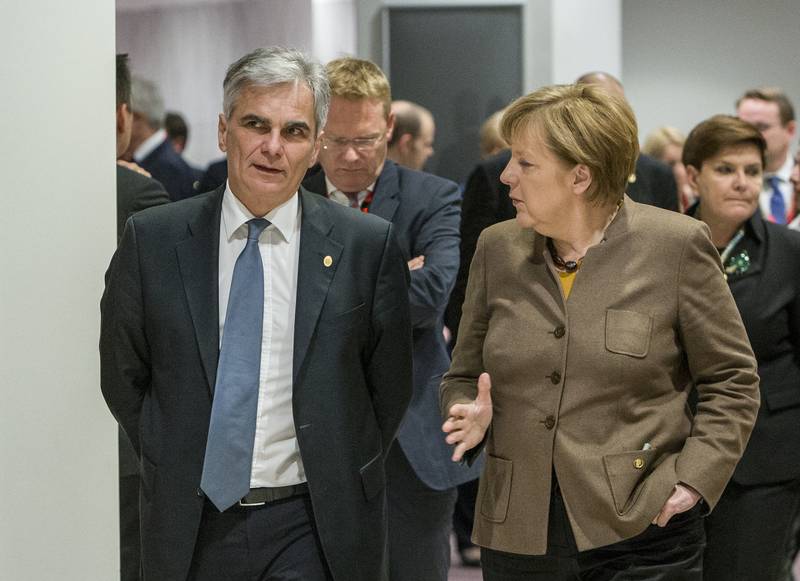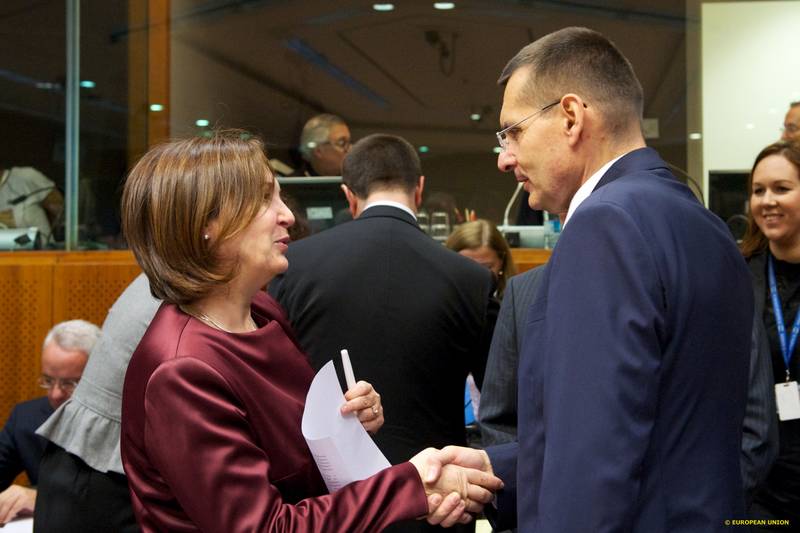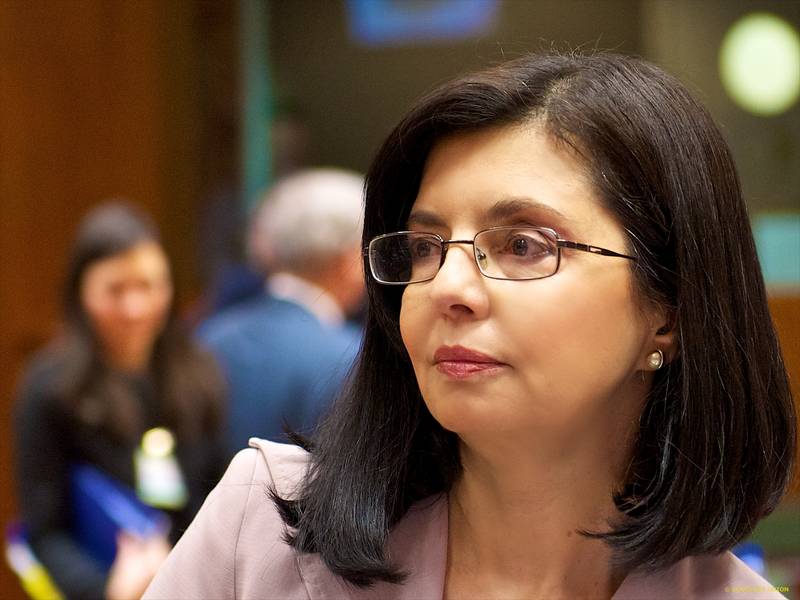Croatia Has Reached the End of the Beginning
Adelina Marini, March 28, 2013
Croatia's path to the EU membership seems cleared after on March 26th Stefan Fule, the EU enlargement commissioner, personally handed the last monitoring report of the European Commission at an extraordinary meeting of the Croatian government in Zagreb. The meeting took place without excessive solemnity and lasted no more than 30 minutes during which Prime Minister Zoran Milanovic very briefly mentioned the work that has been done and talked much more about not only the tasks that the country will have after accession on 1st of July this year, but also which the EU will face. Commissioner Fule also talked more about the future and in terms of the past he said only that Croatia was a success story.
How prepared is Croatia for membership on July 1st?
This is the question which will torment the MPs in the countries that have not yet completed the process of ratification of Croatia's accession treaty. The three most important and influential of them are Germany, The Netherlands and Denmark. Berlin announced several months ago that it will complete the procedure once it sees the last European Commission report to make sure that Croatia will not repeat the fate of Bulgaria and Romania which joined the EU on January 1st 2007 and still have not finished the reforms, especially in the area of the judiciary and fight against corruption. And although with Croatia the Commission changed the approach by not only increasing the number of chapters, but also by holding a much thorougher process of assessment of the implementation of the tasks, it can be seen in the report that there still is work to do.
With its October report, the Commission outlined ten tasks which had to be completed by the time of accession and in general work on them was rather technical and Croatia did it well. Commissioner Fule said that in general the country has completed the tasks, but a perusal of the report shows where a problem could emerge. This is in the task that requires a track record to continue on the basis of efficient, effective and unbiased investigation and prosecution in organised crime and corruption at all levels, including in vulnerable sectors such as public procurement. And the key word here is, as in Bulgaria and Romania too, more final sentences.
But the report says that, although the legal and institutional framework for the fight against corruption and organised crime is adequate, the number of sentences on cases for organised crime is low. In the area of corruption, the sentences are also a few and very often are suspended. According to the Commission, it is necessary the sentences related to corruption and organised crime to be commensurate to the size of the crime and to do the utmost to avoid creating a climate of impunity, as such is evident in Bulgaria. Prime Minister Zoran Milanovic said during the government meeting on Tuesday that Europe is "allergic to the squandering of European money", but if there is anything it is really allergic to that is organised crime to take over governance.
In terms of fight against corruption on local level, where the most vulnerable sector is public procurement, the report says that the system for checking dismissals of criminal cases by the prosecutor does not ensure independent checks of the decisions by the state prosecutors.
Another vulnerable area in Croatia is preventing conflict of interest. The report says that already enforced are the necessary amendments to the law on financing political activities and electoral campaigns and it is pointed out that the upcoming local elections in May will be a test for the improved rules. Regarding public procurement, however, in spite of the increased transparency by the introduction of new legislation, Croatia needs to undertake more measures to prevent irregularities, especially in projects co-financed by the cohesion policy. Besides, the country needs to ensure a strong mechanism to prevent corruption in state-owned companies, including when it comes to membership in supervisory and management boards.
It is the conflict of interest and transparency of public procurement that was the focus of Romanian MEP Monica Macovei (EPP), a former minister of justice in Romania, who demanded during the discussion of the report on Croatia's progress in the European Parliament, a mechanism to be introduced on the country, similar to that for Bulgaria and Romania. Her proposal was not accepted, but Croatian non-governmental organisations insist on some form of monitoring after accession rather inside the country and by the civil sector.
A new system of salaries should also be introduced based on merits, to create reward mechanisms and retention of skilled staff. A coincidence or not, but on the same day when Commissioner Fule presented the report on Croatia in Zagreb, the chief of the Croatian state-owned gas company, Plinacro, resigned over controversial appointments, one of which is of the husband of Anka Mrak Taritas, minister of construction.
The big challenge is the economy
Where the economy is in severe situation, usually corruption grows. In that regard, Croatia is facing huge challenges. In the report, the Commission touches upon the issue very briefly pointing out that important steps have been undertaken in terms of the "urgently needed" structural reforms in the economy, aimed at improving competitiveness and growth perspectives. The report takes into account Croatia's voluntary participation in the European semester this year which, according to the Commission, will provide a good opportunity for the country to develop structural reforms agenda. In his address to the ministers in the cabinet, Mr Fule pointed out that Croatia has to continue with the structural reforms not only because in the future it will join the eurozone, but also because it has to increase the competitiveness of the economy.
But the developments in the eurozone, however, where another country has shaken the area of the single currency (Cyprus), shows that yet in the accession period these countries showed flaws which in the then global and economic circumstances were not taken into account. This is why I asked Commissioner Fule whether, given those problems, the focus should be increased on economic and fiscal problems in the enlargement process. He said that in the past period of enlargement the focus was on the rule of law, but it is necessary to direct the attention of the candidates on increasing their competitiveness. 2013 to be the year when the candidate countries will be dragged deeper into the new economic governance of the EU, the commissioner added.
Croatia's Prime Minister Zoran Milanovic, for his part, assured that a Cypriot scenario is excluded in Croatia. He did not miss to note that a large share of the blame for the situation in Cyprus was with the EU itself. "And the second problem of Cyprus is that until everyone benefited from this, they closed their eyes". According to the Croatian premier, Cyprus is a classical example of a "mono culture and a country that lives on provisions". Now it has to pay the price, Milanovic said and added that such a thing will not happen again in the future. In the end of the government meeting, the Croatian prime minister made a remarkable analysis of the situation in Europe, saying that Europe is complex, but that its greatest problem are constant changes. We often compare ourselves with the US which have the same institutional environment functioning quite well for more than 240 years now.
The EU is constantly changing, which is Europe's power but its weakness as well, Milanovic pointed out. The current crisis requires from Europe to finally determine itself and that we stop changing every five years, he concluded.
The next Croatian goal
Although the process of accession of Croatia to the EU is not complete yet because a test will be the completion of the ratification process, Croatia already has a new goal - joining Schengen in 2015. Zoran Milanovic admitted that this will not be as simple judging from the fact that some countries need a lot of time to join. He did not mention Bulgaria and Romania specifically, but they are the only ones who fail to join the Schengen area of security despite the fact that the Commission and the European Parliament said two years ago that the two countries fulfil "technically" the criteria. The biggest problem, however, is that the two countries demonstrate a chronical incapability to tackle corruption at all levels and in the case of Bulgaria organised crime as well, which makes a growing number of member states to insist both countries to remain outside Schengen.
But Zoran Milanovic said Croatia will commensurate itself with the best and the first deputy prime minster and minister of foreign and European affairs, Vesna Pusic, pointed out that the country has mastered the technology. The key, she said, was in the judiciary which she called "the mother of all chapters". And yet, the country's accession both to the EU and to Schengen happens under the thick shadow of Bulgaria and Romania which was evident by the question of a Croatian journalist who asked whether Croatia would be a "more adequate" EU member state. This question completely confused the enlargement commissioner who said that the membership category in the EU was only one and that isa fully fledged membership. Bulgaria and Romania have the same rights as all the others. He recalled that the two countries are being monitored under the Control and Verification Mechanism in the area of judiciary. But he underscored that it would be to the benefit of the entire EU if there were no longer need of such a mechanism.
There are only several weeks until Croatia becomes the 28th member state of the EU, but this will hardly be an occasion for celebration against the backdrop of the severe problems the other 27 members are facing. The country has huge ambitions to be a leader for the countries in the region which are yet to embark on the long path (it took Croatia 10 years) to the EU. But the biggest help which it can ensure for them is to tackle the problems that some of the earlier members have failed to - Bulgaria, Romania, Hungary, but also neighbouring Slovenia which recently shrank into a tough political crisis, caused by economic problems. Commissioner Fule congratulated Croatia for the excellently done job, but in fact it is just about to begin. As Premier Milanovic said, we have reached the end of the beginning.
 Werner Faymann, Angela Merkel | © Council of the EU
Werner Faymann, Angela Merkel | © Council of the EU Rumyana Bachvarova, Petre Toba | © Council of the EU
Rumyana Bachvarova, Petre Toba | © Council of the EU Meglena Kuneva | © Council of the EU
Meglena Kuneva | © Council of the EU Kolinda Grabar-Kitarovic | © KGK
Kolinda Grabar-Kitarovic | © KGK Jozo Rados | © European Parliament
Jozo Rados | © European Parliament Aleksandar Vucic, Andrej Plenkovic | © Vlada RH
Aleksandar Vucic, Andrej Plenkovic | © Vlada RH